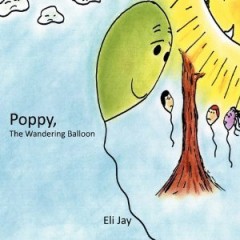 There is nothing worse than watching your child struggle through the trials and tribulations that come along with friendship. There are many children books out that help children learn to make new friends, maintain friendships, and recognize what makes them desirable to other children for companionship.
There is nothing worse than watching your child struggle through the trials and tribulations that come along with friendship. There are many children books out that help children learn to make new friends, maintain friendships, and recognize what makes them desirable to other children for companionship.
Poppy, The Wandering Balloon by Eli Jay is just such a story.
Delightful new story for children invites young readers and their families into a world that can sometimes be awkward and unsettling, but is always full of friendship and adventure if you try your best.
Poppy, The Wandering Balloon is facing the cold, cruel world for the very first time. His greatest wish is to come down from the sky and to make new friends. Along the way, he encounters some difficulty with a group of his peers. Despite Poppy’s hopes to befriend them, Tassy, Julius and Gib just do not want to know him, telling Poppy that he cannot be their friend. They even shun him altogether, which makes Poppy very sad indeed. He simply cannot understand why this rejection has happened to him, especially since he had tried so hard to please them. Poppy asks the old teacher, Mr. Widdles, for advice on how he can make his peers like him. But Mr. Widdles words are confusing and poor Poppy falls into a state of loneliness, thinking he’ll never have a friend to call his own. Nevertheless, he bravely decides to go in search for the answers by himself. With some guidance from the Sun, Poppy begins to realize that he must never give up hope and must keep trying to make his peers like him for who he really is. In the end, Poppy succeeds, which fills him with happiness, especially as he finally understands that all he needed to do was be himself.
I had high hopes for Poppy, as the title reminded me of one of my favorite children’s movies [amazon_link id=”0385142978″ target=”_blank” ]The Red Balloon[/amazon_link]. Unfortunately, Poppy falls way below this classic in terms of aesthetics and message.
I found the story of Poppy awkward at best. Mr. Widdles’ advice is reminiscent of [amazon_link id=”1561553697″ target=”_blank” ]The Rainbow Fish[/amazon_link], where in order to be liked and make friends you have to give away something special about yourself. This advice is rejected at the end of the book, but it remains on the main character’s mind throughout and I fear would do so for little readers as well.
This book does not explain why Poppy is shunned by the other balloons. There is no description of his initial attempt to form friendships. If this book really meant to teach children how to make new friends, I think specific suggestions would be helpful such as introducing yourself, complementing, asking other children their names, not trying too hard, etc.
I am also annoyed the Sun is in charge of blowing the wind.
After rejection and Mr. Widdles’ advice, Poppy begins a search for finding something special he can do or learn to make the other balloons like him. He thinks of playing basketball or riding a bike, but only makes excuses for having no arms and legs. This just is strange…especially considering when Poppy returns to the other balloons, they have got their basketball stuck in a tree. Aren’t they also lacking limbs?
Poppy finally makes friends by getting the basketball stuck out of the tree. It is nice he is helpful, but is that truly how our children will be able to make friends? I think it unrealistic to think children have to solve problems for other children in order to be accepted by the group.
The conclusion to the book is:
Poppy now realizes all along he had never had to have some special gifts or know some clever tricks in order to make new friends. All he had to do was be himself and believe in his heart that he is very special in his own way.
I agree with that completely, but I don’t get where in this book that comes from. The lessons on self-esteem and friendship are a stretch from the context of the plot. Besides, wasn’t rescuing the basketball from the tree a special trick? Poppy wrapped his string around the ball and tugged, something the other balloons hadn’t tried. Sounds like a special trip to me, without any sort of reinforcement that Poppy’s nature is to be helpful. Instead of spending pages on why he can’t roller skate or play sports, perhaps Poppy’s wanderings could have been examples of him helping creatures in the forest.
I always feel bad being a harsh critic to a book an author has poured their heart and soul into creating. I can see what the ideas are behind the book, but the text just doesn’t do them justice.
I love to read aloud to my children, but it has to be high quality literature. We have to make our time count!
There isn’t any information on the book about recycled content or FSC certified paper.
Disclosure: I was sent free samples of these products to review. No prior assurances were given as to whether the review would be positive or negative.
Leave a Reply